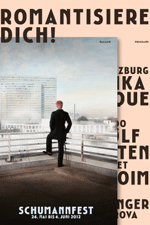> [Archived] Chronicles

Correspondence from 2012 Schumannfest in Dusseldorf
If you listened to my correspondence on Friday, then you might know that I was in Dusseldorf between 24th-26th May, to attend the opening of the Schumann festival in Dusseldorf. This is the most important festival in Germany dedicated to the memory of Robert Schumann - there are two other less important in Zwickau and Bonn. Robert Schumann spent the last years of his musical career in Dusseldorf. Since 1850 he was the music director of the Dusseldorf orchestra. Signs of the mental illness that eventually would lead to Schumann's premature death occurred in Dusseldorf when, in 1854, he first tried to commit suicide by throwing himself into the Rhine.
The darker story of the last years of Robert Schumann's life has nothing to do with the brilliant musical activity that is taking place in Dusseldorf nowadays and the Schumann Festival is one of the successful stories that create this wider picture.
The Schumann Festival in Dusseldorf started in 1981 and it has been organized every two years ever since. I think that the organizers' task - this year Michael Becker is the intendant who also leads the Tonhalle in Dusseldorf - is not easy. The musical life in Dusseldorf generally takes place during the season at a very high level including with many events, as well. To get an idea of the 2011-2012 season at the Tonhalle - the main concert hall in Dusseldorf - Lang Lang's name appeared, as well.
So, the organizers of the Schumann festival had to find other ways than the interpreters' reputation to attract the public into the concert hall. Romantiesiere dich - be romantic - has been the motto of this year's festival, be romantic in a contemporary style - I would add. Robert Schumann's compositions and the compositions that Schumann would have written, if he had lived in our time, were the leading musical works: both classical and less classical concerts including, for example, the jazz evenings with Labeque sisters, contemporary music with pianist Hauschka or a little nightmare music with Ingudesman & Joo.
The opening concert of 24th May was created cleverly for all categories of public taste. It was a transatlantic opening - as the organizers called it - with music by Schumann and American composers, performed by the Emerson String Quartet and American pianist Tsimon Barto, then the Camerata Salzburg conducted by Ariel Zuckermann, with percussionist Martin Grubinger as soloist. It was an extraordinary evening when beyond the ability to listen to a quartet with 10 Grammy awards, we were able to admire the amazing Martin Grubinger in a live concert, whose DVDs I had listened to, a young man who will be 29 years old tomorrow and who can prove that percussion instruments can undoubtedly be stars in a classical music concert.
Not the same favourable impression did the second night of the festival make - that in which the American pianist Tsimon Barto gave a recital at the Robert Schumann Hall of the Dusseldorf Art Museum. Known as an eccentric man of culture with vast intellectual pursuits - he knows, for example, six languages, among which ancient Greek and Latin - Tsimon Barto was known as one of the leading pianists of his generation in the 80s. Now, Haydn, Brahms and Liszt sound the same in Barto Tsimon's interpretation - i.e. without a steady rhythmical pulsation, with an uneven performance of the piano fragments and a very fast performance of the forte ones; an attempt to approach it intellectually which could not stand and finally proved boring.
My journey to Dusseldorf was a fascinating experience that I will share with you during the upcomind days, as well. The diary of my journey: in a series of special radio reports aired starting tomorrow on Drivetime - the radio show broadcast between 17:30 and 19:00.
Translated by Elena Daniela Radu
MTTLC, Bucharest University














